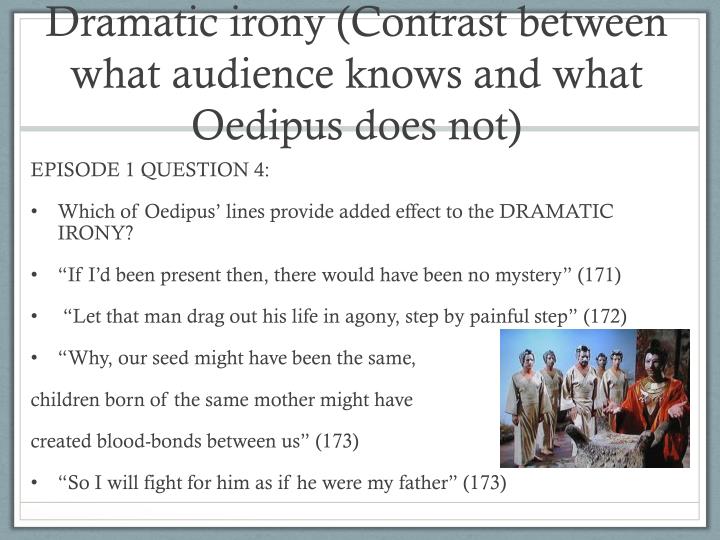
Teiresias explains how as Oedipus entered as the King of Thebes, he was oblivious to the fact that he had not overcome the prophecy in which he would kill his father and marry his mother. Teiresias foretells, “”He that came seeing, blind shall he go…son, and husband to the woman who bore him father-killer…when you can prove me wrong, then call me blind (38). Irony surfaces as even though Oedipus can physically see, he is blind to the truth as he is not willing to accept that he had murdered Laius. They reveal how sight represents an understanding of the truth blindness represents ignorance. Through the conversation between Oedipus and the blind prophet, they demonstrate the symbolism behind sightedness and blindness. Oedipus’s hubris causes him to become blind to the fact that he had killed Laius and does not think practically that this incident may be connected with a murder he had committed before. On the other hand, Teiresias is blind but can still foretell that Oedipus had committed the crime and could not escape from his fate. Through the repetition of the word “”eyes”” Teiresias mocks how even though Oedipus was granted with the physical ability to see, he is still unable to discern that he had committed Laius’s murder.

Teiresias does not remain quiet in the midst of Oedipus’s insults as he replies, “”Have you eyes, and do not see your own damnation? Eyes, and cannot see what company you keep? (37). He refuses to believe himself as the killer and as he forces Teiresias to repeat the name, it fuels his anger as he revolts by insulting Teiresias in order to protect his ego. As he repeatedly threatens Teiresias to reveal the name of Laius’s murderer, and he finally replies with Oedipus’s name, Oedipus reacts with disgust and rage. Oedipus’s pride leads to his downfall as it acts as an impediment to the truth. Give us your paper requirements, choose a writer and we’ll deliver the highest-quality essay! Order now His pride consumes him, causing him to act impetuously towards the prophet as he insults him fearlessly in blind rage before taking a moment to understand Teiresias’s reason for why he hesitates to reveal the murderer’s name. Oedipus displays his arrogance as he is unwilling to place his pride aside and calmly heed to the prophet of truth.

As Oedipus sends for the blind prophet, Teiresias, and he refuses to reveal the name of the murderer, Oedipus does not hesitate to reply, “”I tell you I do believe you had a hand in plotting…this very act (35). Feeling powerful and intelligent, Oedipus is confident that he can solve the answer to any riddle given to him without difficulty, such as in detecting the murderer of the previous king, Laius.

Oedipus views himself as an honorable character and reveals this with pride as he explains that he is even well-known to lands far from Thebes. After solving the complicated sphinx riddle and being crowned king of Thebes, Oedipus is confident as he begins his opening scene with a boast: “”I, Oedipus, whose name is known afar (25). In the play, Oedipus Rex, Oedipus’s pride blinds him to the truth as he tries to control his fate, until he ultimately realizes the truth once he is physically blind.Īt the beginning of the play, Oedipus views himself as a hero.

As people become biased toward certain views, it can cause them to become blinded by even the most evident facts. However, the public’s attitudes towards blindness are misconceptions as even a person who can physically see can also be blind. Others believe that blindness defines ignorance as one is unaware of their surroundings or actions. Some people tend to view blindness as a physical disability that resembles inferiority. There are a variety of connotations to the phrase “”blind. “”We are only as blind as we want to be -Maya Angelou.


 0 kommentar(er)
0 kommentar(er)
